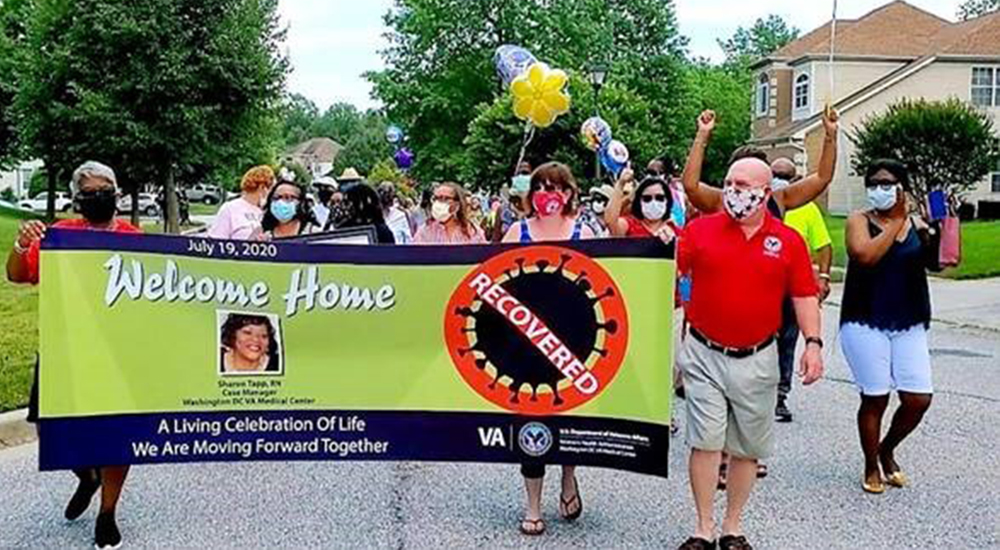It has been a long, tough fight for Sharon Tapp, a VA registered nurse.
She began experiencing sudden body weakness, chest pains, headache and high fever in March. As a result, doctors admitted Tapp to Johns Hopkins Suburban Hospital in Bethesda, Md. Ten days later, her condition became worse. Medical staff medevaced her to the Johns Hopkins facility in Baltimore.
There, the nurse who has spent her whole adult life caring for others, was cared for in the intensive care and cardiac care units.
Doctors put Tapp on a ventilator and medically induced a coma. She received dialysis and a treatment called extracorporeal membrane oxygenation (ECMO). The ECMO treatment, often considered the “last resort” for COVID-19 patients, oxygenates and recirculates the blood, allowing the vital organs to rest and heal.
Two months in a coma
Tapp spent two months in the coma, hooked to a ventilator, dialysis and an ECMO machine simultaneously. When she awoke, she had a tracheal tube inserted into her throat to help with the ventilator. She also had a feeding tube placed in her stomach.
Tapp has made steady progress. With the help of the multidisciplinary physical medicine and rehabilitation team, she is working through physical, occupational and speech therapy. She is re-learning to stand, walk, swallow, chew, sip from a straw and test her cognitive abilities. Doctors at Johns Hopkins say Tapp’s recovery is miraculous.
Her family, friends and D.C. VA Medical Center coworkers kept vigil outside the hospital. Due to the virus’ contagious nature, Tapp could not have visitors. Her family formed a prayer assembly line that stretched from Maryland to California. Her church family from Springfield Baptist Church in Washington, D.C., lifted her up in prayer three times a day.
Tapp arrived home July 17, and the excitement among family, friends and colleagues was tremendous.
After full recovery, Tapp plans to return to the D.C. VAMC. She has worked there for the past 13 years as an inpatient nurse case manager who coordinates and assists Veterans with their discharge from the hospital.
Loves working with Veterans
Tapp loves working with Veterans. The mission is personal — her uncles, brothers and cousins have all served in the military. She refers to her D.C. VAMC coworkers as “family” and they call her the “social butterfly.”
She has a very long road ahead of her and both of her “families” are happy to have her home.
The photo at the top of this blog shows Tapp’s festive “Living Celebration of Life” welcome home (with physical distancing) parade. Participating in the parade were family, friends, D.C. VAMC teammates and the Johns Hopkins medical and therapy teams.
Topics in this story
More Stories
The Medical Foster Home program offers Veterans an alternative to nursing homes.
Watch the Under Secretary for Health and a panel of experts discuss VA Health Connect tele-emergency care.
The 2024 National Veteran Suicide Prevention Annual Report provides the foundation for VA’s suicide prevention programs and initiatives.







